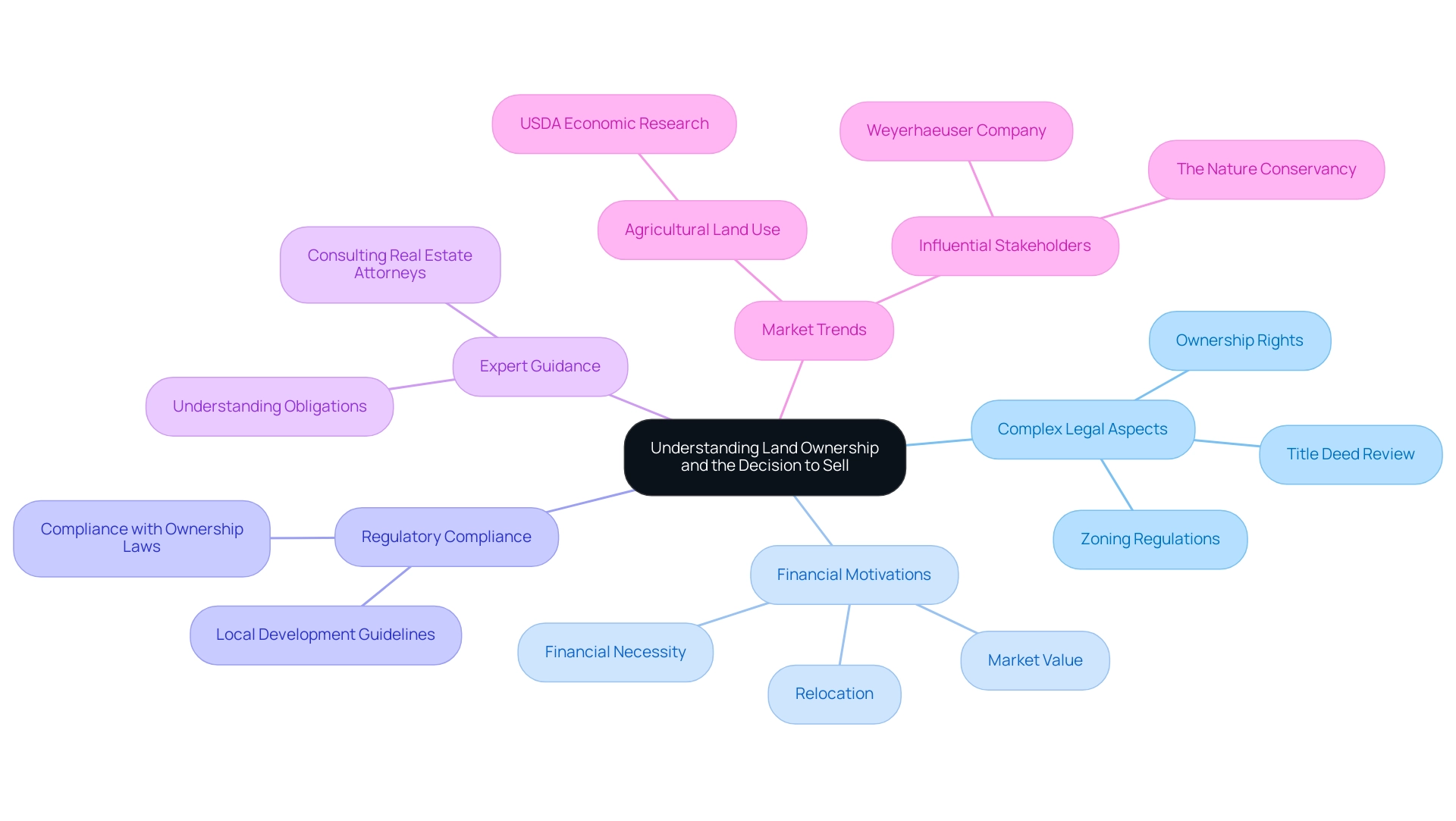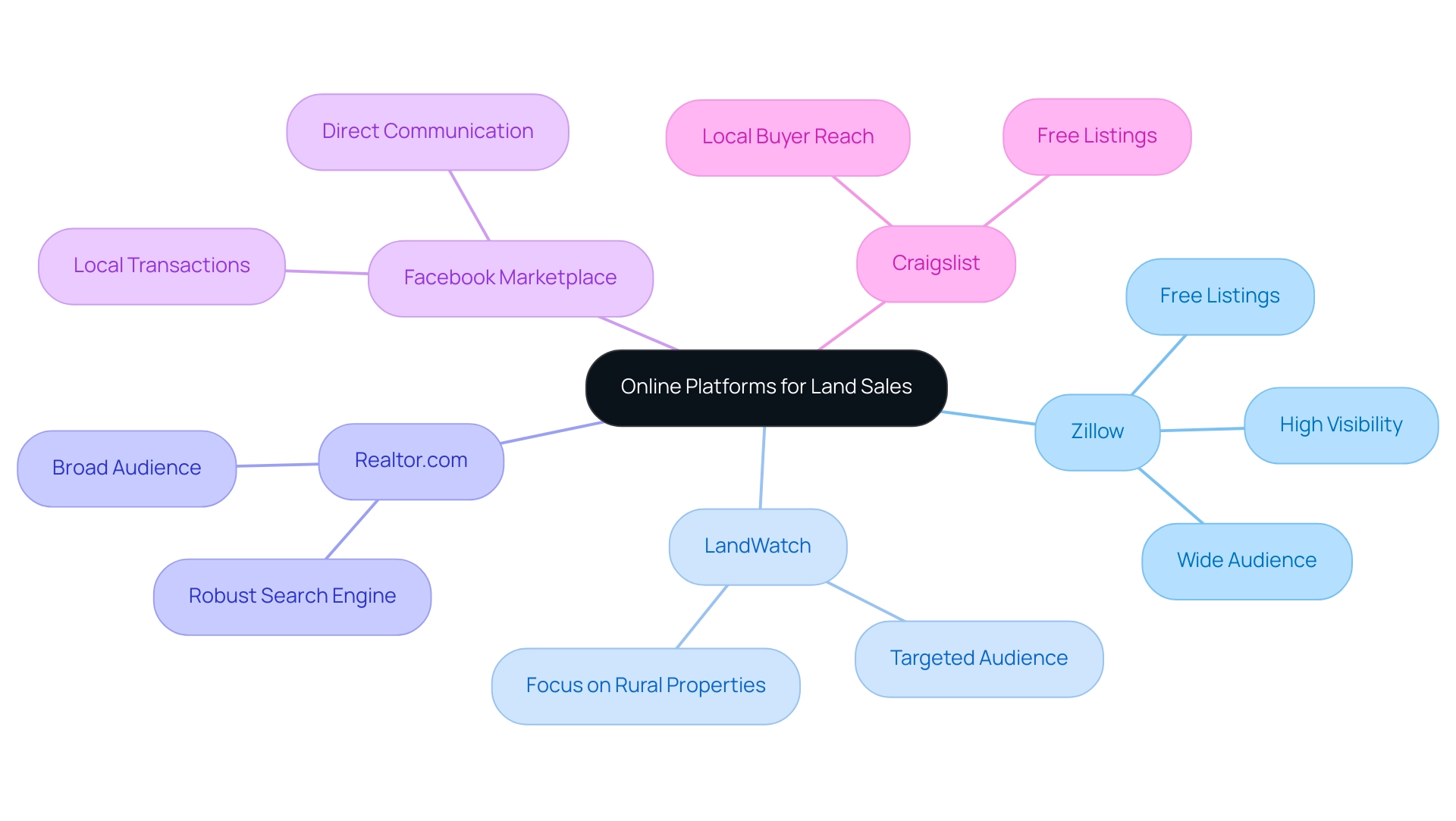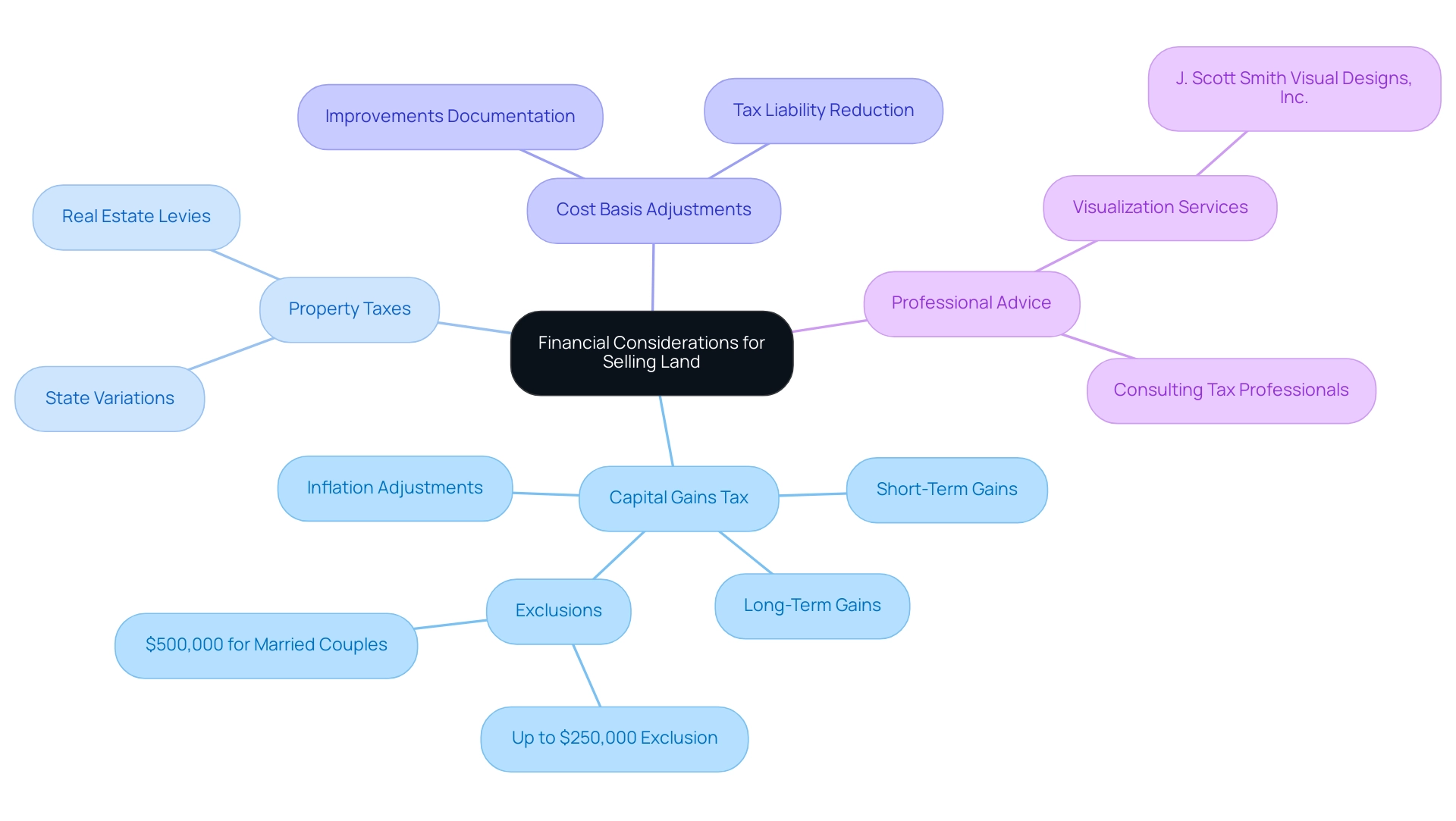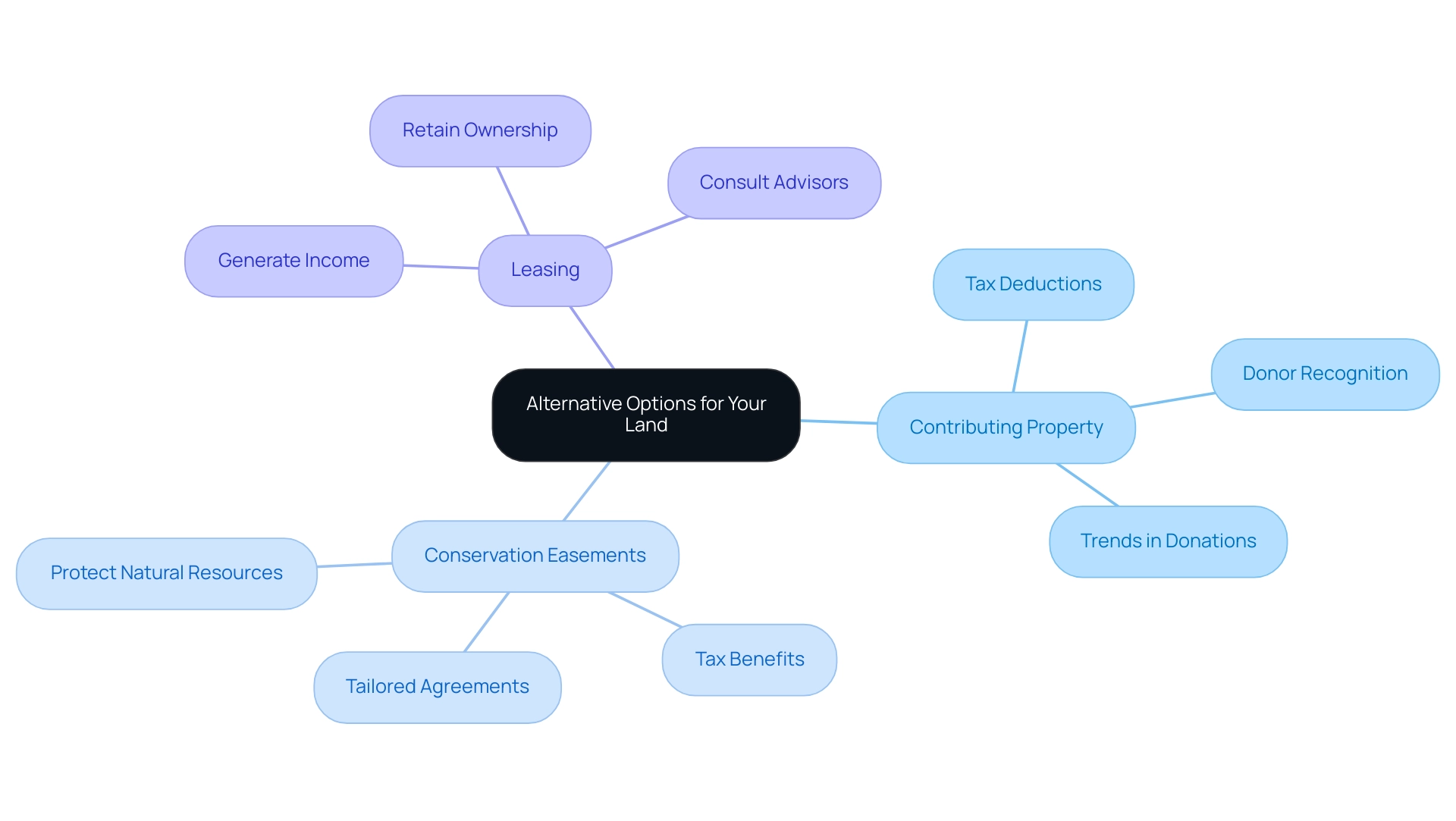Overview
Selling your land can feel like a daunting task, filled with uncertainties and challenges. It’s completely understandable to feel overwhelmed by the legal aspects, the preparation needed, and the intricacies of finding the right buyer. This article is here to support you every step of the way.\n\nWe recognize that understanding the legalities of land sales can be intimidating. It’s crucial to have a solid grasp of these aspects to avoid any pitfalls. Preparing your land properly is another significant step; it sets the stage for a successful sale. We want to reassure you that with the right guidance, these challenges can be navigated effectively.\n\nConducting a professional appraisal is essential, as it helps you understand the true value of your property. This knowledge empowers you to make informed decisions. Additionally, utilizing online platforms for marketing can open up a world of opportunities, connecting you with potential buyers who are genuinely interested in your land.\n\nBy addressing these key areas, we aim to alleviate your concerns and help you maximize your financial outcomes. Remember, you are not alone in this journey. Together, we can navigate the complexities of land sales, ensuring that you feel confident and supported throughout the process.
Introduction
Navigating the complexities of land ownership and the decision to sell can feel overwhelming for property owners. It’s a journey filled with legal, financial, and market factors that can leave anyone feeling uncertain. As the reasons for selling land change—whether it’s due to financial needs, a move to a new place, or the desire to take advantage of market conditions—it’s crucial for property owners to understand the implications of current laws and regulations.
This article aims to support you through this process, addressing the essential aspects of selling land in 2025. Here, you will find a comprehensive guide that covers:
- Preparation
- Pricing
- Marketing
- Financial considerations
From utilizing online platforms to exploring alternative options like donations or conservation easements, this exploration is designed to empower landowners with the knowledge they need to navigate the market confidently and effectively.
Understanding Land Ownership and the Decision to Sell
When considering the transfer of property, it’s important to recognize the complex legal and financial aspects that come with property ownership. Many property owners face challenges in navigating these waters. Reviewing your title deed carefully can help verify ownership rights and uncover any restrictions that might affect your sale. In 2025, motivations for selling land may arise from financial necessity, relocation, or simply wanting to take advantage of the asset’s current market value.
Recent updates in ownership laws have highlighted the need for compliance with local zoning regulations and development guidelines. These factors can significantly impact your property’s marketability and potential uses, which can be quite concerning for sellers. The USDA Economic Research Service notes that as of 2017, 53% of U.S. terrain was utilized for agricultural purposes. This statistic underscores the importance of understanding land usage in relation to market trends and its implications for real estate sales.
Consulting a real estate attorney can be a crucial step in this journey. They can provide invaluable insights into your ownership rights and obligations, ensuring that you feel informed and confident before selling your land. The financial implications of selling property can be substantial; for example, the Buck Family’s ownership of approximately 1,236,000 acres illustrates how large-scale property ownership can significantly influence financial portfolios and investment strategies.
As the landscape of real estate ownership continues to evolve, with influential stakeholders like Weyerhaeuser Company and The Nature Conservancy shaping it, staying informed is essential. Understanding how to sell your land and the selling regulations in Michigan and across the nation is vital for owners looking to navigate this complex market effectively. Remember, you are not alone in this process, and seeking guidance can make a significant difference.
Step-by-Step Guide to Selling Your Land
Prepare Your Land for Sale
Selling your land can feel overwhelming, but taking the right steps can make it a smoother process. Start by clearing away any debris and ensuring easy access for potential buyers. A well-kept estate not only draws attention but also creates a welcoming atmosphere for negotiations. Consider making minor landscaping improvements to enhance curb appeal; after all, first impressions can significantly influence how buyers perceive your property.
Conduct a Professional Appraisal
Understanding the true value of your land is essential, and engaging a qualified appraiser can provide clarity. Typically, the appraisal process takes seven to ten days and involves a thorough assessment of your property, complete with detailed descriptions, photos, and regional transaction data. As Bruce McClary, senior vice president of membership and communications, wisely notes, “The appraised value of a home is crucial in determining the loan-to-value ratio, or LTV, which lenders use to assess risk.”
This insight underscores the importance of a professional evaluation in establishing a fair market price, which is vital for successful transactions. A detailed appraisal report not only helps set a competitive price but also aids in eliminating poor design choices before construction begins, giving you peace of mind.
Gather Necessary Documents
To streamline your selling process, compile all relevant paperwork. Essential documents, such as the title deed, survey maps, and any environmental assessments, should be readily available. Having these documents on hand not only facilitates a smoother transaction but also instills confidence in potential buyers.
Set a Competitive Price
Researching comparable land sales in your area is crucial for setting a competitive price. Understanding trends in property pricing for 2025 can provide valuable context. By analyzing recent sales data, you can position your property effectively, helping you achieve a successful sale.
Market Your Property
Create eye-catching listings that showcase high-quality images and compelling descriptions to highlight your land’s potential. Utilizing advanced 3D architectural rendering services from J. Scott Smith Visual Designs can elevate your marketing efforts, allowing prospective buyers to visualize the possibilities your property offers. Our precision-focused exterior renderings capture the essence of your designs, transforming architectural narratives into engaging visual experiences that resonate with clients.
The attention to detail in these renderings not only showcases the property but also significantly influences buyer perceptions, ultimately helping you sell your land more effectively.
Negotiate Offers
When offers come in, be prepared to engage in negotiations with potential buyers. Consider their offers and counteroffers thoughtfully, keeping in mind the appraised value and current market conditions. Effective negotiation can lead to a favorable outcome for both parties.
Close the Sale
Finally, working with a real estate attorney to finalize the sale is crucial. Ensuring that all legal documents are executed correctly protects your interests and provides peace of mind as you complete the sale.
Ready to take the next step?
If you’re ready to move forward, contact J. [Scott Smith Visual Designs today](https://kiplinger.com/taxes/capital-gains-tax/602224/capital-gains-tax-rates) to schedule a consultation. Let us show you how our preliminary renderings can help bring your design concepts to life.
Exploring Online Platforms for Land Sales
In today’s digital landscape, selling your land can feel overwhelming, but you’re not alone. Effectively utilizing online platforms is essential for a successful sale, and there are some wonderful options available in 2025 that can ease this process:
- Zillow: As a leading real estate platform, Zillow allows you to list your property for free, reaching a vast audience of potential buyers. Recent statistics show that listings on Zillow enjoy significantly higher visibility compared to other platforms, making it a top choice for landowners. Real estate agent Tony Anczer points out that buyers have different preferences for platforms, which can influence how you approach your listing.
- LandWatch: This platform focuses on rural and undeveloped properties, catering specifically to buyers interested in these types of assets. Its targeted approach can help you connect with the right audience, making the selling process smoother.
- Realtor.com: With a robust search engine and a broad audience, Realtor.com offers excellent visibility for property listings. While Zillow is a top performer, Realtor.com also maintains substantial traffic, making it a valuable tool when you want to sell your land.
- Facebook Marketplace: This social media platform is a great option for local transactions, allowing for direct communication with potential buyers. Its user-friendly interface makes it easy for you to engage with interested parties quickly, fostering connections that can lead to sales.
- Craigslist: A longstanding free platform, Craigslist is particularly effective for reaching local buyers, especially for smaller parcels of land. Its simplicity and accessibility make it a go-to choice for many sellers, providing a straightforward avenue for listing your property.
Additionally, when you sell your land to Prime Land Buyers, remember that there are no realtor commissions or listing fees. This can significantly enhance the cost-effectiveness of selling your land, giving you peace of mind.
To maximize your chances of a successful transaction, ensure that your listings feature high-quality images and detailed descriptions. Captivating visuals can greatly boost interest. In fact, 83% of homeowners prefer agents who use drone photography, which can accelerate property transactions by up to 68%. This highlights how crucial it is to showcase your property attractively to potential buyers, making them feel excited about what you have to offer.
Financial Considerations: Taxes and Gains from Selling Land
Before making the decision to sell your land, it’s important to pause and reflect on the financial implications, especially when it comes to taxes.
Capital Gains Tax: If you sell your land for more than what you paid for it, you might face capital gains tax on the profit. The capital gains tax rates for 2025 are designed around how long you’ve owned the property. Generally, long-term capital gains are taxed at lower rates than short-term gains, which can feel overwhelming. Fortunately, adjustments for inflation in 2025 might increase income thresholds, potentially easing the tax burden on your capital gains. If you’ve owned and used the property as your primary residence for at least two of the last five years, you can exclude up to $250,000 from capital gains—$500,000 if you’re married and filing jointly. As finance specialist Tina Orem points out, grasping these details is vital for effective financial planning.
It’s also essential to ensure that all real estate levies are current before selling your land. Unpaid real estate taxes can complicate the transaction and lead to unexpected liabilities, which can be quite stressful. Property tax rates vary by state, and understanding these can help you anticipate potential expenses related to the sale.
Cost Basis Adjustments: Keeping detailed records of any improvements made to your land is crucial. These adjustments can increase your cost basis and potentially lower your capital gains tax liability. Understanding how these adjustments work can significantly influence your tax obligations when selling. Consulting with a tax professional can provide clarity tailored to your situation, helping you strategize for tax efficiency and maximize your financial outcome.
Additionally, considering the visualization services provided by J. Scott Smith Visual Designs, Inc., property owners can gain valuable insights through detailed renderings that showcase the potential of their property. This can empower you to make informed decisions about selling your land while fully understanding the financial implications involved.
Alternative Options: Donating or Conserving Your Land
If selling your property doesn’t align with your goals, it’s important to explore alternative options that may resonate more with your aspirations:
- Contributing Property: Contributing your real estate to a charitable organization or land trust can be a truly fulfilling choice. This not only ensures the preservation of the area but may also provide significant tax deductions. In 2025, statistics indicate that property donations have seen a notable increase, reflecting a growing trend among owners who wish to contribute to conservation efforts. It’s noteworthy that 55% of US donors prefer to be acknowledged for their charitable giving via email, highlighting the importance of recognizing contributions in the context of donations.
- Conservation Easements: A conservation easement is a legal agreement that allows you to restrict the development of your property while still retaining ownership. This option not only protects the area’s natural resources but also offers tax benefits. Environmental advocates emphasize that conservation easements play a crucial role in safeguarding ecosystems while providing landowners with financial incentives. Legal experts point out that these agreements can be tailored to meet specific conservation goals, making them a flexible option for landowners. Additionally, a recent case study on charitable giving trends indicates that older generations are contributing more, which may influence landowners considering donations.
- Leasing: If you prefer to retain ownership while generating income, leasing your land for agricultural or recreational use can be a viable alternative. This approach allows you to benefit financially from your property without relinquishing ownership. Engaging with a legal or financial advisor can help you navigate these options effectively, especially if you decide to sell your land, ensuring that your decisions align with your long-term objectives and values. Staying informed about fundraising statistics and trends is essential for maintaining effective strategies, encouraging landowners to consider the timing and impact of their donations.
Conclusion
Selling land can be a daunting experience for property owners in 2025, and it’s important to acknowledge the complexities involved. This article has highlighted essential steps in the selling process, starting with the need to prepare the land for sale and the value of professional appraisals to ensure accurate pricing. By gathering the necessary documents and setting a competitive price, landowners can significantly improve their chances of a successful transaction.
Marketing plays a crucial role, too. The emphasis on effective marketing through various online platforms shows how increased visibility can greatly impact the selling process. It’s understandable to feel overwhelmed by these requirements, but knowing that there are strategies in place to help can provide some comfort.
Financial considerations are also paramount. Capital gains tax and property tax implications require careful attention, and it’s natural to feel anxious about potential liabilities. By staying informed about these aspects and understanding cost basis adjustments, sellers can strategically plan their sales for the best financial outcomes. For those who may not wish to sell, alternative options like donating land or establishing conservation easements can offer valuable pathways.
Ultimately, navigating the land-selling landscape in 2025 requires a blend of preparation, market knowledge, and financial savvy. By leveraging the insights provided in this guide, property owners can approach the selling process with confidence. This empowerment allows them to make informed decisions that align with their goals. Whether you are considering selling, donating, or preserving your land, understanding these dynamics is crucial in today’s evolving real estate market. Remember, you are not alone in this journey, and there are resources to support you every step of the way.
Frequently Asked Questions
What should I consider when transferring property ownership?
When transferring property, it’s important to recognize the legal and financial complexities involved, including verifying ownership rights through the title deed and understanding any restrictions that may affect the sale.
What are some common motivations for selling land in 2025?
Motivations for selling land may include financial necessity, relocation, or the desire to capitalize on the asset’s current market value.
Why is it important to understand local zoning regulations and development guidelines?
Compliance with local zoning regulations and development guidelines is crucial as they can significantly impact your property’s marketability and potential uses.
What percentage of U.S. terrain was utilized for agricultural purposes as of 2017?
As of 2017, 53% of U.S. terrain was used for agricultural purposes, highlighting the importance of understanding land usage in relation to market trends.
How can a real estate attorney assist in the property selling process?
A real estate attorney can provide valuable insights into ownership rights and obligations, helping you feel informed and confident before selling your land.
What financial implications can arise from selling property?
Selling property can have substantial financial implications, as demonstrated by large-scale property ownership, which can significantly influence financial portfolios and investment strategies.
What steps can I take to prepare my land for sale?
To prepare your land for sale, clear debris, ensure easy access for potential buyers, and consider minor landscaping improvements to enhance curb appeal.
How long does the appraisal process typically take?
The appraisal process usually takes seven to ten days and involves a thorough assessment of the property.
What documents should I gather before selling my land?
Essential documents to compile include the title deed, survey maps, and any environmental assessments to facilitate a smoother transaction.
How can I set a competitive price for my land?
Researching comparable land sales in your area and understanding current property pricing trends can help you set a competitive price for your land.
What marketing strategies can I use to sell my property?
Create eye-catching listings with high-quality images and compelling descriptions, and consider using advanced 3D architectural rendering services to enhance your marketing efforts.
How should I approach negotiations with potential buyers?
Be prepared to thoughtfully consider offers and counteroffers while keeping the appraised value and current market conditions in mind for effective negotiation.
Why is working with a real estate attorney important when closing a sale?
Working with a real estate attorney ensures that all legal documents are executed correctly, protecting your interests and providing peace of mind during the sale process.






0 Comments